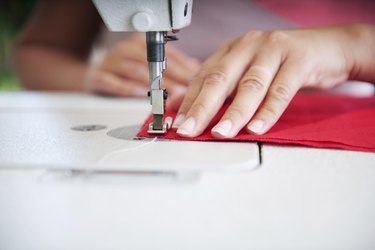
Sewing machines can be frustrating beasts when they don't work right. The ingenious machine uses two threads locked together through the fabric to create stitches. For the machine to work correctly, the threaded needle passes through the throat plate and grabs the thread from the bobbin case to lock the stitch against the fabric. When either the bobbin thread or needle thread catches and doesn't release with an even tension, one or both threads can break before the machine completes the stitch.
Thread Issues
Video of the Day
Verify the bobbin spindle atop the machine is in the sewing position. Make certain the needle is installed with its flat side facing the back of its holder. Thread the needle and open the shuttle cover and pull out the bobbin to see if it is inserted in the correct direction in the shuttle and case. Look to see if thread runs beneath the little flap that adjusts the tension on the bobbin before putting it back. Follow the upper thread to make certain it passes freely through all the guides and the tension disks appropriately. Tug on the bobbin thread so that the thread is about 2 inches long. With the presser foot up and the needle properly threaded, lightly turn the hand wheel toward you as you keep hold of the needle thread to allow it to catch the bobbin thread and bring it up above the throat plate. Both threads must be atop the throat plate to begin sewing.
Video of the Day
Dirty Shuttle Case
As you use the machine, lint and fabric debris builds up inside the shuttle area under the feed dogs and the throat plate of the machine. To access this area, remove the bobbin shuttle from the machine, following the instructions for your specific machine, as each model may be different. With the bobbin case, bobbin and shuttle removed, remove all the lint, thread pieces and fabric debris from inside this area. Look up under the backside of the feed dogs -- the series of teeth atop the throat plate -- and pull out any lint or debris caught there. Reassemble the bobbin into the shuttle case and place both back into the machine. Rethread and try again.
Thread Tension
Too-tight thread tension can cause both or one of the upper and lower threads to break before they have a chance to join and lock the stitch in place. The bobbin case has a little inverted tooth that catches the upper thread from the needle and pulls it in a circle to lock it and create the stitch. If the tension on the bobbin or the thread through the needle is too tight, it prevents a smooth unrolling of the thread from the bobbin or the spool, and either one or both break. Check your owner's manual to adjust both the upper and lower thread tensions correctly. Adjust the tension on the bobbin case by turning the small screw clockwise to tighten and counterclockwise to loosen.
Machine Timing Issues
The machine timing gets off if you mistakenly turn the hand wheel away from you instead of toward you, which can cause a misalignment of the belt and gears. Once the machine timing is off, nothing you do can fix the machine; instead, it requires a trip to a sewing machine technician, mechanic or professional. As with other machines that have belts and gears, sewing machines require routine maintenance and oiling or periodic part replacement.